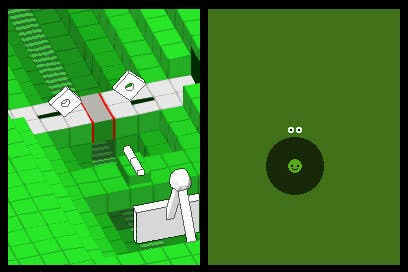Rhythm Paradise
Tap tap revenge.
In one micro-game you play the AI at a game of table tennis, sweeping the stylus upwards on the screen to bat the ping-pong ball back at your opponent in time with the music. If your opponent lobs the ball it takes a whole bar of music to reach you, if it's a normal strike it takes half a bar and if it's a fast strike, just a beat. Trying to time inputs based on visual cues will have you tripping up, as perspective distorts the rhythm of the ball's moment. In this case, it's far easier simply to close your eyes and listen out for the audio cues, and for this reason, the difficulty can be inconsistent, peaks and troughs of challenge failing to form an elegant learning curve.
The structure of the game is linear but also ingenious. You must clear a stage to unlock the next one, with each batch of four mini-games followed by a 'Remix', a challenge that mashes up both the audio and visual elements of the preceding tasks. After each mini-game you're given an appraisal of your performance. Anything less than a perfect performance in which you miss no beats will be awarded with an 'OK' or 'Just OK' rank, with 'Superb' reserved solely for the flawless.
At set points in your progress you'll be issued with a challenge: to score a perfect grade in a particular mini-game. Unfortunately, if you've already perfected that game, you'll still have to do it again, meaning that it's best to attack levels sequentially, only returning to perfect a stage when the challenge is explicitly set. During these runs for perfection, the lack of an instant restart option in the menu is frustrating, the game instead returning you back to the main hub if you quit out.

There are plenty of aspects to Rhythm Paradise that were inaccessible to non-Japanese speakers who imported it as Rhythm Tengoku Gold last year. There's a bar area where you can chat with a friendly waitress (who will unlock the next mini-game for you if you've failed three times in a row and you ask her nicely). Similarly, scoring 'Superb' ratings earns medals that, in turn, unlock neat 'sound toys' to play with, as well as additional endless-mode games to tackle. As with WarioWare, a lot of the humour derives from the visuals, but Nintendo's ever-solid localisation team turns in an amusing script, one which does little to justify the mini-games' ridiculous scenarios, but lots to enhance them.
When John Walker reviewed the game on import he pointed out quite rightly that it lacks some of the succinct brilliance of its predecessor. While the GBA game (which was available only in Japan) met the simplicity of its hardware with raw ingenuity, here on the DS, with a multitude of control options, Nintendo has been given freedom to slightly over-think things.
Nevertheless, the game has an elegant simplicity when set against the intrinsic fussiness of the Guitar Heroes and Rock Bands of the world. It is a videogame that has no aspiration toward being anything other than being a videogame, but one which still tests your rhythmic competence every bit as stringently as Harmonix et al. It's the kind of thing that Nintendo rarely makes these days, and the kind of music game that's almost never made these days. A joyful, exuberant celebration of the rhythms that underpin our existence, Rhythm Paradise is as demanding as it is creative, and as beguiling as it is bonkers.
